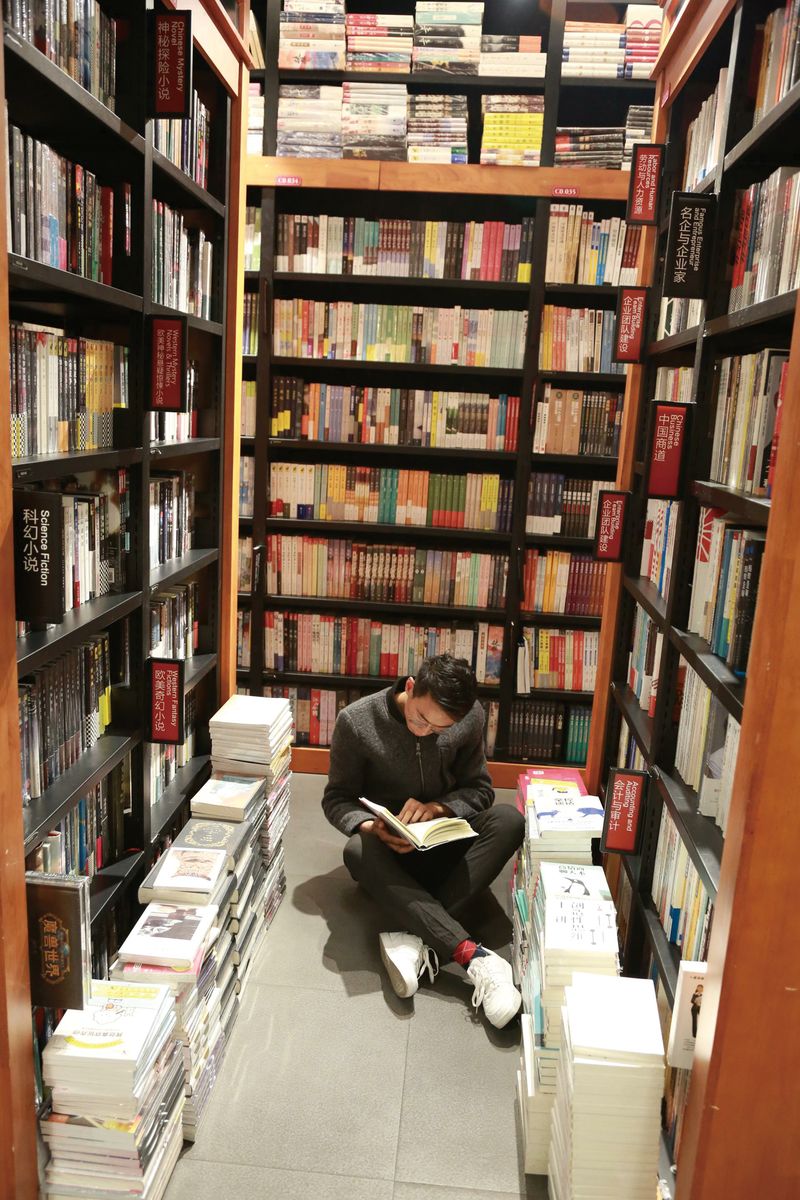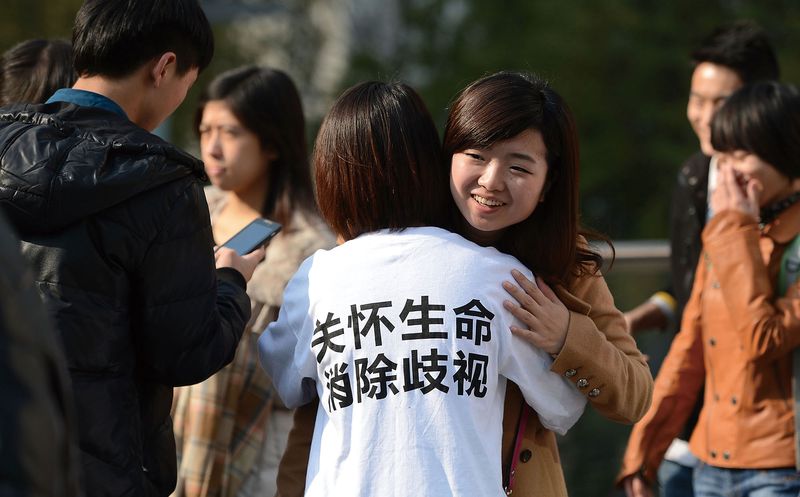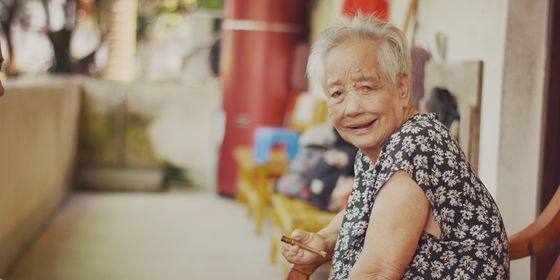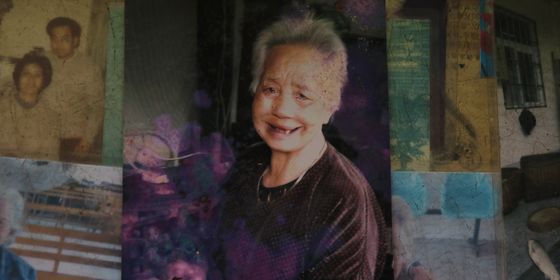Over 30 years after China’s first diagnosed HIV/AIDS case, patients still battle stigma and ignorance
“Can you call me tomorrow morning? Right now, he’s here with me and I can’t talk about ‘it,’ you know what I mean?” 27-year-old Laurel writes to TWOC on WeChat. “He” is Laurel’s legal husband (though she still calls him “fiancé”), and Laurel indicates she would only be available to chat before he gets home each day at 5:30 p.m.
Laurel, who works at a jewelry store in China’s southeastern Fujian province, is one of an estimated 1.3 million people in the country living with HIV, according to a survey published earlier this year. She says there are “less than five people” who know of her condition, including her doctor and her mother, but her husband is not one of them. “Honestly, I don’t know how he is going to react,” says Laurel, describing her daily life as “walking on a wire.”
Since the world’s first case of AIDS (acquired immunodeficiency syndrome) was diagnosed in San Francisco in 1981, the lives of people with HIV have become increasingly visible—even shown on TV, as in the BBC series It’s a Sin. In China, however, the disease remains a socially taboo subject.
Chinese researchers diagnosed the country’s first AIDS case in 1985 and its first locally transmitted infection in 1990. In the following decade, the mysterious, deadly disease ravaged parts of the country, fueled partly by tainted blood transfusions. In the mid-90s in central China’s Henan province, 70 percent of households in some villages reported at least one person infected with HIV.
In the 1990s, China’s response to the AIDS epidemic focused mainly on treating infected people and monitoring certain groups, including sex workers, long-distance truck drivers, and pregnant women, as well as people who injected drugs, those who sought treatment for sexually transmitted diseases, and men who had sex with men (MSM).
In 2003, China’s then-Premier Wen Jiabao unveiled a broader response program called the “Four Frees and One Care.” The initiative offered free antiretroviral drugs to AIDS patients in rural areas and those with financial difficulties; free HIV testing and counseling; free drugs for HIV-infected pregnant women to reduce mother-to-child transmission; free testing for newborns; and schooling for children orphaned by AIDS. Since 2013, China has provided universal access to HIV medications.
In 2005, China diagnosed 40,711 total people living with HIV/AIDS, with 5,729 deaths documented. Up until 2018, the most recent year when data is publicly available, however, the number has skyrocketed to 820,756 with 253,031 deaths. Researchers believe there is a huge gap between these figures and the actual number of infected people, partly due to society’s stigmatization and ignorance of the disease, which leads people to avoid seeking diagnosis.
The demographics of people living with HIV in China are also changing. Whereas the virus used to be prevalent among blood donors and high-risk injection drug users in southern border provinces, where narcotics smuggling is a persistent social issue, current data indicates that HIV rates are rising among MSM, young people between the ages of 15 and 24, sex workers, and seniors.
In 2018, Laurel fell sick with a strange, lasting cold with a fever, which worsened so rapidly that she was hospitalized. After asking about her past relationships, her doctor told her that she had likely contracted HIV from a previous sexual partner.
Laurel stayed in hospital for four months, receiving treatment for a whirlwind of complications around her kidneys, liver, stomach, gallbladder, and heart. Because she was not registered as a local resident, the state only paid 30 percent of her medical fees. Her family put up the remaining sum—almost 1 million RMB (155,000 USD)—from loans and from funds raised by a local volunteer network.
Although Laurel has partly recovered from her physical ailments, she still battles the mental distress the disease has caused. She says she worries about being a financial burden on her family and fears that other people will find out about her condition.
Laurel used to think that people living with AIDS were “social deviants.” “Before it happened to me, I kind of had the understanding that people who had AIDS deserved it, because they’d messed up their own lives by being promiscuous or taking drugs,” she says. “I’ve gotten to know a lot more about HIV and accidental exposure since having it myself, but I have zero hope that people around me will really understand.” In Quanzhou, the city where Laurel lives, a restaurant owner sued a competitor in 2017 for spreading a rumor that he had contracted AIDS, which forced him to close his noodle shop.
Laurel found it easy to conceal her condition, partly because her friends naturally distanced themselves from her after hearing she was ill. Her mother, fearing that Laurel would die young, urged her to get married. Relatives introduced Laurel to her future husband while she was still in the hospital, and he became a frequent visitor to her ward. “I was extremely weak, and he would carry me upstairs, downstairs, everywhere. He’s really so good to me,” she recalls.
Throughout their courtship and on into their marriage, Laurel never revealed her AIDS diagnosis to her husband. She continues to keep him in the dark despite knowing that her relatively high “viral load”—the amount of HIV in her blood—puts him at elevated risk of contracting the virus, for example if they have unprotected sex.
“I still think he has the right to know,” Laurel says. “There were times when I could have told him, but I couldn’t bring myself to do it. Now that we’re married, I feel the window has passed.” Laurel’s decision could also have legal ramifications. Chinese law states that if a person with HIV fails to disclose their diagnosis, their partner can apply for an annulment of the marriage within one year of learning about the condition.
Laurel’s conflict echoes many of China’s current legal and ethical debates around medical privacy. In many countries, including the US, confidentiality between doctors and patients is not absolute if the latter’s medical information affects the public good—such as in criminal cases or public health crises—or endangers their spouse or other family members.
In China, the rules are vaguer. The country’s AIDS prevention and treatment regulations, enacted in 2006, state that people with HIV have a “responsibility” to disclose their condition to their sexual partners, though they have the right not to disclose to other people if it does not affect the public good or a family member’s health. Additionally, China’s Civil Code bars hospitals and medical personnel from disclosing patients’ diagnoses and personal information. However, the rules are unevenly enforced, and some clinics have been known to share information about people’s HIV status with their partners as part of a “premarital checkup” they offer.
Since moving in with her husband in March last year, Laurel has led a careful double life. She takes her medication only when he’s not around, and avoids having sex with him or talking about having children, using her continued physical weakness as an excuse. She feels that as long as she’s unable to tell him about her diagnosis, keeping her distance is the more ethical thing to do, but her secret takes a heavy psychological toll.
“I’ve even started deliberately distancing him, telling him that I don’t love him and want him gone,” she says. “To me this is a matter of morality. I can’t make another victim [by infecting him].”
Speaking Out
When he speaks to TWOC, 29-year-old Lawrence Li is one week away from the fifth anniversary of his AIDS diagnosis. To celebrate, the Beijing-based nonprofit worker plans to rent an Airbnb, invite friends over for a party, and write something about the ups and downs of his life in the past half-decade.
Li, who requested partial anonymity for privacy reasons, contracted HIV through sexual contact, the most common mode of transmission in China. In 2015, he had unprotected sex with another man and developed symptoms of infection, but delayed seeking treatment for so long that he eventually developed AIDS.
In Li’s home region of Yiyuan county, in eastern China’s Shandong province, people tend to shun the few among them who live with AIDS. Li recalls hearing fellow villagers speculate about the morals of people infected with HIV, and repeat the unfounded claim that you could contract the virus by eating with an infected person.
Li says his parents were devastated to hear that he had AIDS. They knew little about the disease and were afraid that the authorities would take their son away. They also felt ashamed because locals associated chronic illness with being unproductive and HIV infection with being promiscuous.
“When I was first hospitalized, my father would say things like, ‘Why, out of all the bad diseases, did you have to get this one?’” Li tells TWOC. “People sympathize with you if you have other diseases, but not this one.”
Li’s other relatives also reacted negatively to his diagnosis, fearing that they could contract HIV by speaking to him or being in the same room. His uncle even refused to let him visit his grandmother, and a cousin went around “warning” everyone they knew about his infection.
Eager to escape the hostility, Li began to think about leaving his hometown. “Being ill brought me a lot of physical pain, but it was also illuminating, as it made me see that parental love and love from family and friends is not unconditional,” he says. “What they love is a healthy, heterosexual child that lives up to Chinese social expectations.”
Li’s unmet health care needs were another concern. He began experiencing abdominal pain soon after his diagnosis, but doctors in Shandong took a year to realize that his body was developing resistance to the medication—and they had run out of the new medicine he needed.
Access to treatment remains a challenge for many people with HIV in China. Those who can afford to do so can buy expensive imported medicines, some of which are smuggled across the border, while the rest can obtain 12 types of free drugs provided through the state health care system. However, barring a lengthy transfer process, the latter group must fill their prescriptions in the place where they were first diagnosed.
Unsurprisingly, many people with HIV live or work far from their place of diagnosis. The issue became particularly acute during the height of China’s Covid-19 outbreak in the first half of last year, when neighborhood lockdowns made it difficult for many people to get treatment, or even get permission to travel for medical reasons without disclosing their condition to the authorities. In general, people who want to get free HIV/AIDS medication must report to the local disease control bureau, a requirement that makes many people hesitant due to the risk to their privacy.
In the summer of 2018, Li moved to Beijing. He transferred to Youan Hospital, one of the capital’s best institutions for HIV treatment. His care is covered by China’s national medical insurance scheme—an option not always available to those without regular employment—with Li chipping in a monthly individual contribution of around 400 RMB.
Within a month of moving to Beijing, Li found work as an accountant at a small company. Chinese laws prohibit private firms from requiring employees to disclose if they have HIV, a rule that does not extend to the public sector, in which employees have to pass a medical check that screens out those with certain diseases.
Nonetheless, many private firms skirt the rules by requiring new employees to undergo a mandatory medical checkup. In the end, Li lost his job: His boss saw the draft of a social media post Li had written after being denied service at a dental clinic due to his condition, and terminated his contract the following day.
Li says he felt too exhausted to fight his dismissal. “There’s an overwhelming number of overlapping obstacles to fight against if a person with HIV tries to defend their rights,” he says. “This is one of the biggest traps for us. We face discrimination in access to health care, so our deteriorating health takes a toll on our finances. Or, we encounter rejection in the workplace, so we can’t afford better medication.
“We’re not talking about just one vicious cycle, but several,” he continues. “I know of someone who had a breakdown after finding out that he had AIDS and was committed to a psychiatric ward, but even there they refused to take AIDS patients.”
Still, moving to Beijing has been a positive experience for Li. An avid user of dating apps, he is often surprised at how open-minded most of his dates are about the fact that he has HIV. He considers himself lucky, as many people with HIV who reveal their condition to their partners face humiliation, demands for compensation, and even physical violence.
In Li’s eyes, the demonization of HIV/AIDS in China owes much to a lack of comprehensive sex education, which covers the basics of sexually-transmitted diseases but focuses on teaching abstinence. This, in turn, leads sexually active people to avoid seeking timely intervention when they suspect they have been exposed to HIV.
Meanwhile, Li says, many people in China who contract HIV feel guilty when they engage in a romantic relationship, even though “every party should shoulder an equal share of responsibility for safe sex.”
Further adding to the problem is that many people in China associate HIV with male homosexuality and promiscuity. Li, who now works at a nonprofit focusing on LGBTQ issues, has witnessed how negative public perceptions divide those communities. He says that when he writes about his experiences on social media, he often receives criticism from LGBTQ commenters who want to disconnect their sexual orientation from HIV/AIDS.
But speaking up is the best way to dismantle stereotypes, Li says. “If we avoid talking about this while there’s all this misinformation flying around, then being gay will always be equated with promiscuity and the ‘original sin’ behind getting AIDS. Meanwhile, AIDS will be seen as a disease that only threatens gay men.”
According to Li, such views blur the real reason why many people contract HIV in the first place: engaging in high-risk sex. “Without proper sex education, young people might think they can avoid HIV as long as they don’t have many partners, even if they’re still having unprotected sex.”
These days, Lawrence gives basic counseling to people living with HIV to help shake their internalized stigma. He also applies for grants to run advocacy projects that bring together people with and without HIV in workshops and events that aim to dismantle prejudice.
As Li’s health and finances improve, his parents’ attitudes are also slowly changing. His mother has joined a variety of groups for HIV patients and their caregivers, and his father has started nudging him to get married and have children—a step forward in accepting his son’s condition, if not his sexual orientation.
Laurel, however, isolates herself from local volunteer groups for people with HIV, citing the need to keep her condition a secret. During her hourlong interview with TWOC, she sometimes speaks optimistically about hoping to live her life as fully as possible. At other times, her words are clouded with uncertainty and fear. She repeatedly says how grateful she is that her husband has stayed with her, adding that she intends to tell him the truth when the time is right.
Names have been changed to protect the identity of the interviewees.
China’s Silent Epidemic: HIV/AIDS Patients’ Struggle to Live Life Out of the Shadows is a story from our issue, “Upstaged.” To read the entire issue, become a subscriber and receive the full magazine.
















